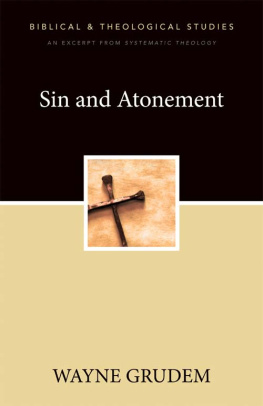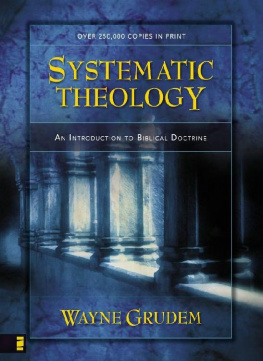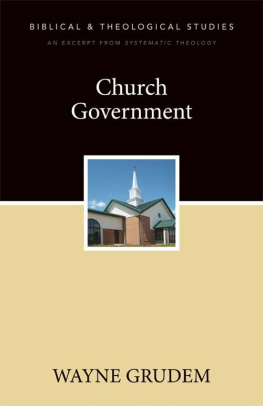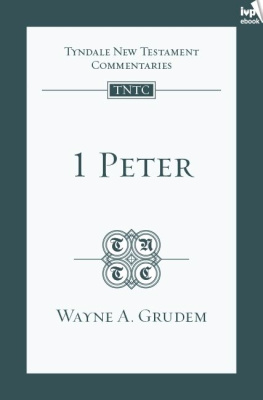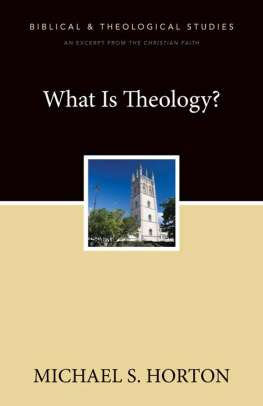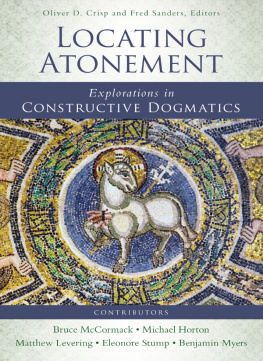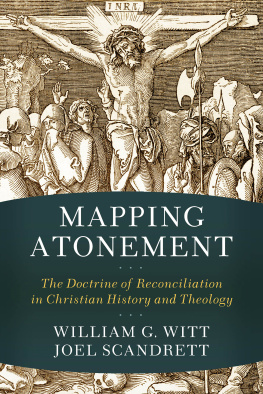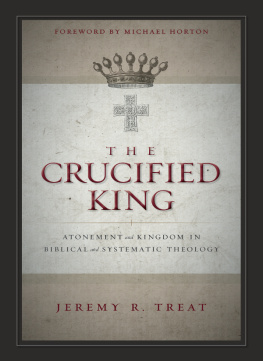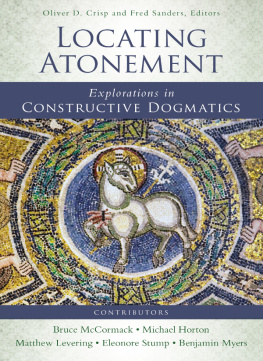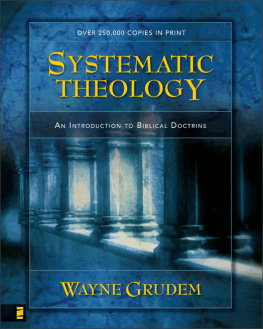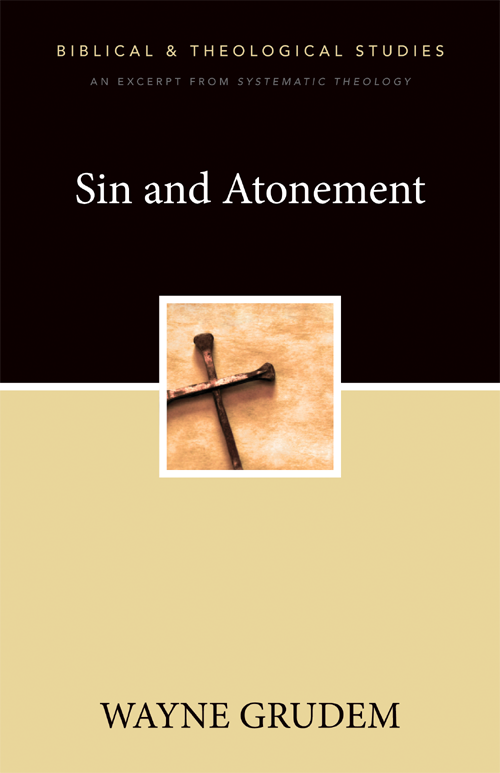
Sin and Atonement
Previously published in Systematic Theology
Copyright 1994 by Wayne Grudem
Appendix 6 and glossary copyright 2000 by Wayne Grudem
Requests for information should be addressed to:
Zondervan, Grand Rapids, Michigan 49530
EPub Edition JANUARY 2012 ISBN-13: 978-0-310-49623-6
Unless otherwise noted, Scripture quotations are taken from the Revised Standard Version of the Bible, copyright 1946, 1952, 1971, by the Division of Christian Education of the National Council of Churches of Christ in the USA, and are used by permission. However, the author has, with permission, modernized archaic personal pronouns and has changed the verbs accordingly.
Scripture quotations marked NASB are from the New American Standard Bible, copyright 1960, 1962, 1963, 1968, 1971, 1972 by the Lockman Foundation, La Habra, California. Used by permission.
Those marked NIV are from the Holy Bible: New International Version. NIV. Copyright 1973, 1978, 1984 by International Bible Society. Used by permission of Hodder and Stoughton Ltd. and Zondervan.
Use of italic in Scripture quotations indicates Wayne Grudems emphasis.
Any Internet addresses (websites, blogs, etc.) and telephone numbers in this book are offered as a resource. They are not intended in any way to be or imply an endorsement by Zondervan, nor does Zondervan vouch for the content of these sites and numbers for the life of this book.
All rights reserved under International and Pan-American Copyright Conventions. By payment of the required fees, you have been granted the non-exclusive, non-transferable right to access and read the text of this e-book on-screen. No part of this text may be reproduced, transmitted, down-loaded, decompiled, reverse engineered, or stored in or introduced into any information storage and retrieval system, in any form or by any means, whether electronic or mechanical, now known or hereinafter invented, without the express written permission of Zondervan.
Cover design: Ron Huizinga
Contents
: Sin
What is sin? Where did it come from? Do we inherit a sinful nature from Adam? Do we inherit guilt from Adam?
: The Atonement
Was it necessary for Christ to die? Did Christs entire earthly life earn any saving benefits for us? The cause and nature of the atonement. Did Christ descend into hell?
Sin
What is sin? Where did it come from? Do we inherit a sinful nature from Adam? Do we inherit guilt from Adam?
EXPLANATION AND SCRIPTURAL BASIS
A. The Definition of Sin
The history of the human race as presented in Scripture is primarily a history of man in a state of sin and rebellion against God and of Gods plan of redemption to bring man back to himself. Therefore, it is appropriate to consider the nature of the sin that separates man from God.
We may define sin as follows: Sin is any failure to conform to the moral law of God in act, attitude, or nature. Sin is here defined in relation to God and his moral law. Sin includes not only individual acts such as stealing or lying or committing murder, but also attitudes that are contrary to the attitudes God requires of us. We see this already in the Ten Commandments, which not only prohibit sinful actions but also wrong attitudes: You shall not covet your neighbors house. You shall not covet your neighbors wife, or his manservant or maidservant, his ox or donkey, or anything that belongs to your neighbor (Ex. 20:17 NIV). Here God specifies that a desire to steal or to commit adultery is also sin in his sight. The Sermon on the Mount also prohibits sinful attitudes such as anger (Matt. 5:22) or lust (Matt. 5:28). Paul lists attitudes such as jealousy, anger, and selfishness (Gal. 5:20) as things that are works of the flesh opposed to the desires of the Spirit (Gal. 5:20). Thereforea life that is pleasing to God is one that has moral purity not only in its actions, but also in its desires of heart. In fact, the greatest commandment of all requires that our heart be filled with an attitude of love for God: You shall love the Lord your God with all your heart, and with all your soul, and with all your mind, and with all your strength (Mark 12:30).
The definition of sin given above specifies that sin is a failure to conform to Gods moral law not only in action and in attitude, but also in our moral nature. Our very nature, the internal character that is the essence of who we are as persons, can also be sinful. Before we were redeemed by Christ, not only did we do sinful acts and have sinful attitudes, we were also sinners by nature. So Paul can say that while we were yet sinners Christ died for us (Rom. 5:8), or that previously we were by nature children of wrath, like the rest of mankind (Eph. 2:3). Even while asleep, an unbeliever, though not committing sinful actions or actively nurturing sinful attitudes, is still a sinner in Gods sight; he or she still has a sinful nature that does not conform to Gods moral law.
Other definitions of the essential character of sin have been suggested. Probably the most common definition is to say that the essence of sin is selfishness. But such a conclusion is clearly wrong.
It is far better to define sin in the way Scripture does, in relationship to Gods law and his moral character. John tells us that sin is lawlessness (1 John 3:4). When Paul seeks to demonstrate the universal sinfulness of mankind, he appeals to the law of God, whether the written law given to the Jew (Rom. 2:1729) or the unwritten law that operates in the consciences of Gentiles who, by their behavior, show that what the law requires is written on their hearts (Rom. 2:15). In each case their sinfulness is demonstrated by their lack of conformity to the moral law of God.
Finally, we should note that this definition emphasizes the seriousness of sin. We realize from experience that sin is harmful to our lives, that it brings pain and destructive consequences to us and to others affected by it. But to define sin as failure to conform to the moral law of God, is to say that sin is more than simply painful and destructiveit is also wrong in the deepest sense of the word. In a universe created by God, sin ought not to be. Sin is directly opposite to all that is good in the character of God, and just as God necessarily and eternally delights in himself and in all that he is, so God necessarily and eternally hates sin. It is, in essence, the contradiction of the excellence of his moral character. It contradicts his holiness, and he must hate it.
B. The Origin of Sin
Where did sin come from? How did it come into the universe? First, we must clearly affirm that God himself did not sin, and God is not to be blamed for sin. It was man who sinned, and it was angels who sinned, and in both cases they did so by willful, voluntary choice. To blame God for sin would be blasphemy against the character of God. His work is perfect; for all his ways are justice. A God of faithfulness and without iniquity, just and right is he (Deut. 32:4). Abraham asks with truth and force in his words, Shall not the Judge of all the earth do right? (Gen. 18:25). And Elihu rightly says, Far be it from God that he should do wickedness, and from the Almighty that he should do wrong (Job 34:10). In fact, it is impossible for God even to desire to do wrong: God cannot be tempted with evil and he himself tempts no one (James 1:13).

